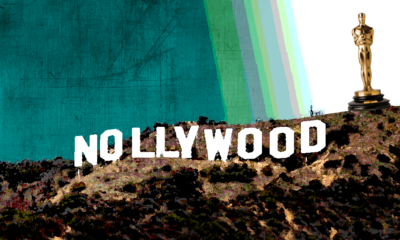This movie is a directorial effort of the award winning Nigerian film auteur, Izu Ojukwu.
Until the title was recommended to me, I didn’t really feel the publicity of the film.
The film?
A true life epic love story of a young couple that wrestles mental health challenge inflicted on the bride on her wedding day.
Okay, generally the film is a masterpiece of visual art, especially on cinematography and production design. If you are a fan of ‘old school’ nostalgia, you will find the art direction irresistible.
The story is linear with an attempt of suspense that refuses to suspend – maybe for me though (talking about why Richard Mofe-Damijo – RMD spent the community’s money).
I like the fact that the wife’s mental illness is attributed to medical defect from poison, and not paranormal phenomenon that is synonymous with Nollywood narratives.
Unless you are a critical or technical audience, not everyone will notice the chroma effects. In plotting that, Izu really did a yeoman’s job in my estimate. And I think to achieve such period ‘back-to-the-past’ film, studio and green walls are key, just like they must key.
The twist of the money coming from Reverend Father, introduction of the white lady and final settlement of outstanding debt is somewhat unconvincing though.
Generally, I would like to know the consumption pattern of the movie in the weeks ahead. It is too early to talk about the number of eyeballs.
I also think Izu’s penchant for oscillating between arthouse and commercial films impends the commercial viability of his films in most cases. That’s not a sin anyway, the choice is his and his sponsors.
The typical “you mock me, I revenge” syndrome that is synonymous with ‘Igbonglish’ films prominently featured in the plot. Though, the execution of the poison is more pedestrian compared to the regular Upper Iweka road directors – too cheap.
I like the palm oil processing depiction. We need to feature our indigenous crafts and trades regularly. It invokes cultural memory and positions our cultural products for world recognition.
The traditional marriage is also good as cultural exhibition of Nigeria’s specs.
The use of relics and vintage cars will make you go green with envy.
The costume?
Here and there. The wigs on the male casts could make you throw up. Maybe because I was not born in the 40s and 60s anyway.
Character and characterisation?
As usual, Chiwetalu Agu is stereotyped as a regular over-acting character – his trade in stock. But for others, their acting is not bad.
RMD (Hillary) is too rigid and flat. I doubt if the emotional preparation is intensed.
There is a struggle to pin his dialogue to his acting.
Nse Ikpe-Etim (Theresa) gave her best in particularisation and immersion. But the camera angles didn’t do justice to her role interpretation. She deserves pity through empathy, unfortunately, I see Nse, not Theresa, in the film.
The eldest daughter and narrator (Essien) looks real and infectious. Perhaps because she is relatively unknown.
Alli Baba tries not to be a comedian, but it’s a difficult task on the part of the viewer to disconnect his permanently etched funny optics.
Seun Akindele (younger Hillary) could not get out of his Yorubaness to properly fit into the Igboness, a weakness that is explained with dialogue.
For Teni Makanaki and Broda Shaggy, I don’t know their usefulness, music relevance and act in the movie. I think this is a real issue with table casting.
Generally, I think Izu paid more attention to cinematography and production designs than other aspects of the production life cycle.
4-4-44 is a lesson about love, loyalty and perseverance.
The movie is on Prime Video. Take your time to see it and let’s compare notes.
Like this:
Like Loading...
Related

 Trailers3 weeks ago
Trailers3 weeks ago
 Entertainment4 weeks ago
Entertainment4 weeks ago
 Entertainment4 weeks ago
Entertainment4 weeks ago
 Entertainment2 weeks ago
Entertainment2 weeks ago
 Entertainment3 weeks ago
Entertainment3 weeks ago
 Entertainment3 weeks ago
Entertainment3 weeks ago
 Entertainment4 weeks ago
Entertainment4 weeks ago
 Entertainment4 weeks ago
Entertainment4 weeks ago
























